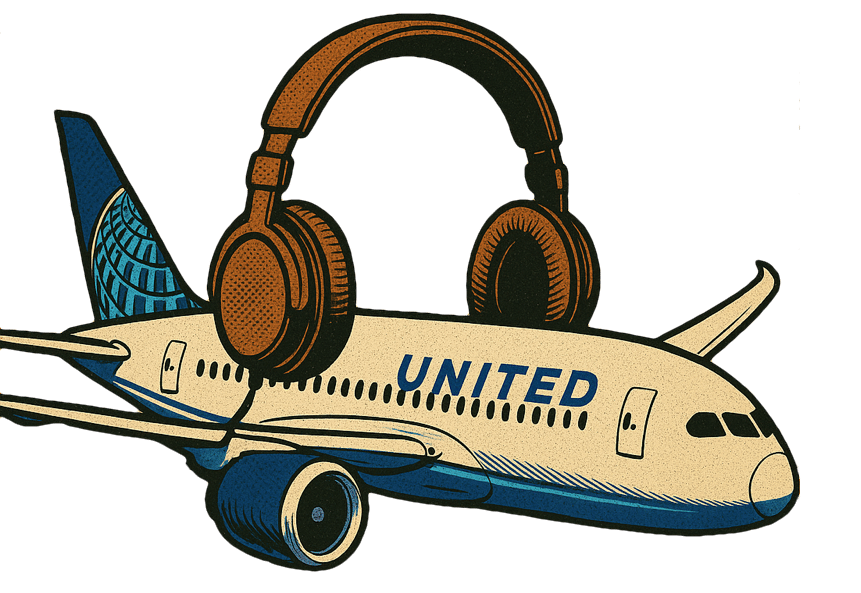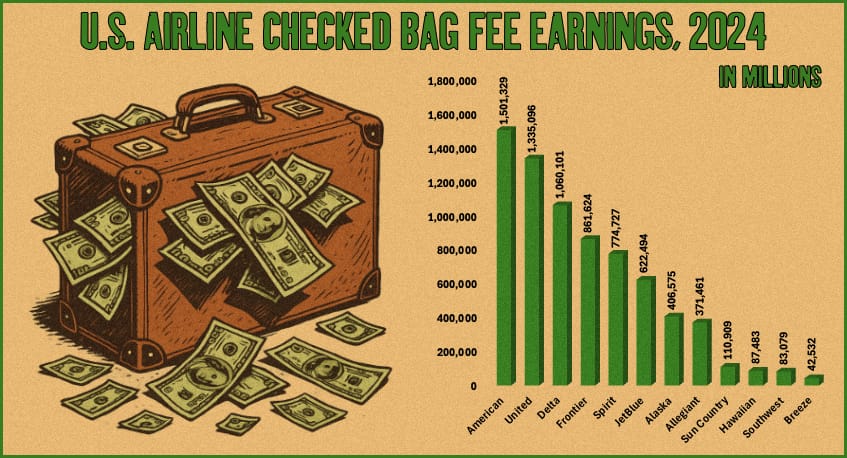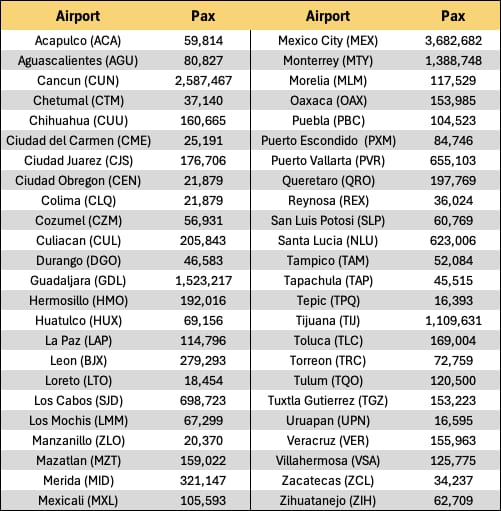Flight 2 // GUADALAJARA, MEXICO
NEW AND PROPOSED ROUTES
United Airlines (UA) is tipped to add weekly service from Washington Dulles (IAD) to Jackson Hole, Wyo. (JAC) on December 20. A Boeing 737-700 will be rostered on this route.
Alaska Airlines (AS) will begin flights from Seattle (SEA) to Seoul Incheon (INC) on September 12. This route will be operated by Boeing 787-9 equipment rather than the originally planned Airbus A330.
SUSPENDED ROUTES
American Airlines (AA) will suspend a half-dozen trans-Atlantic during the winter:
Charlotte (CLT) to Munich (MUC) from early January until mid-February; Dallas/Fort Worth (DFW) to Frankfurt (FRA) from early January until mid-February; New York Kennedy (JFK) to Madrid (MAD) for a few weeks from late January until mid-February; New York Kennedy to Milan Malpensa (MXP) from early January until mid-February; New York Kennedy to Paris DeGaulle (CDG) from early January until early March; Philadelphia (PHL) to Zurich (ZRH) for most of January.
SEASONAL ROUTES
Delta Air Lines (DL) will add daily seasonal service from December 20 through January 4 on two routes: Minneapolis (MPS) to Vail, Colo. (EGE) on an Embraer E175 and New York Kennedy to Sarasota, Fla. (SRW) on a Canadair CRJ-900. Both will of course be operated by regional partner airlines under the Delta Connection banner.
AVIATION SECURITY
TSA screeners have intercepted 22 guns in carry-on bags so far this year in Minneapolis (MSP), including a pair on June 3. 52 firearms were caught in 2024 at the airport. Individuals who bring their gun to a security checkpoint also face a federal financial civil penalty. TSA determines the penalty amount for a violation based on the circumstances in each case. TSA will revoke TSA PreCheck eligibility for at least five years for passengers caught with a firearm in their possession.
The Trump administration has terminated the Transportation Security Administration’s (TSA) “Quiet Skies” program, a domestic surveillance initiative that covertly monitored U.S. travelers without criminal suspicion. Homeland Security Secretary Kristi Noem cited the program’s failure to prevent any terrorist attacks and its annual cost of approximately $200 million as reasons for its discontinuation. Noem also alleged that the program was politicized under the Biden administration, favoring political allies and targeting opponents. For instance, William Shaheen, husband of Senator Jeanne Shaheen, was reportedly granted exemptions despite associations with individuals flagged by the program, while former Representative Tulsi Gabbard was subjected to surveillance after criticizing then-Vice President Kamala Harris. The Department of Homeland Security is calling for a congressional investigation into the program’s alleged misuse. Despite ending Quiet Skies, TSA will continue essential security vetting to ensure traveler safety.
AVIATION INDUSTRY NEWS
Ukraine has adopted a strategic drone campaign aimed at disrupting Russian air travel, particularly targeting Moscow’s major airports. Since January 1, 2025, Ukrainian drones have prompted at least 217 temporary airport closures across Russia, surpassing the combined total for 2023 and 2024. This approach seeks to exert pressure on Russia’s internal logistics and weaken public morale by causing widespread travel disruptions. The strategy underscores Ukraine’s intent to make the Russian population feel the direct consequences of the ongoing conflict.
TRAVEL BAN II: On Wednesday, President Trump signed a proclamation reinstating and expanding a travel ban that restricts entry into the United States for citizens from 12 countries, including Afghanistan, Iran, Libya, Somalia, and Yemen. The ban, set to take effect today, also imposes partial restrictions on seven additional nations, such as Cuba, Venezuela, and Laos. The administration cites national security concerns, high visa overstay rates, and inadequate identity verification processes as justifications for the policy. Exemptions are provided for lawful permanent residents, dual nationals traveling on passports from non-banned countries, diplomats, athletes participating in major sporting events, and certain family-based visa applicants. Critics argue that the ban disproportionately affects vulnerable populations and undermines U.S. humanitarian commitments, drawing parallels to the controversial 2017 travel ban upheld by the Supreme Court in 2018.
It’s always interesting to learn how much airports pay for various items. Dallas/Fort Worth will pay $1,937,000 for the purchase and installation of two more automated exit lanes. These will be placed by Gates B7 and B29, joining two already in use at Gates A19 and A33. The current exits used by passengers to go from the gate area (secured side) to the baggage claim and ticket counter areas (unsecured side) are continually monitored by contract staff to ensure these exits are not used to get to the secured side without going through security. The automated exit lanes improve security and eliminate the need for constant staffing. Separately, the airport approved a $30 million, five-year contract for maintenance of 71 jet bridges and associated ground support equipment such as generators, rooftop air conditioning units, pre-conditioned air systems, bag lifts, potable water cabinets, and condensate pumps.
MISHAP: On May 28, 2025, a Saudia (SV) Boeing 787-9 (HZ-ARF) was significantly damaged at London Heathrow (LHR) when a service truck collided with its fuselage. The incident occurred shortly after passengers had disembarked from Fl. 105 from Jeddah (JED) at Terminal 4. According to reports, the driver of the lorry mistakenly pressed the accelerator instead of the brake while performing a routine safety maneuver, causing the vehicle to pierce the aircraft’s aft fuselage near stand 414. The damage rendered the aircraft unfit for immediate service, leading to the cancellation of its return flight to Jeddah and causing delays in baggage reclaim operations. Emergency services, including firefighters and police, responded to the scene as per aviation safety protocols. Responsibility for the damage is presumed to lie with airport services provider ABM, though formal comments from the company and airline are pending.

MISHAP II: A preliminary report from the National Transportation Safety Board (NTSB) reveals that improper maintenance likely led to a fire aboard an American Airlines Boeing 737-800 at Denver (DEN) on March 13, 2025. Flight 1006, en route from Colorado Springs (COS) to Dallas-Fort Worth (DFW), diverted to Denver after the crew reported high engine vibrations. After landing and taxiing to the gate, the right engine caught fire. Investigators found that a fuel fitting in the right engine was loose and installed backwards, causing a fuel leak. Additionally, a component controlling airflow through the engine’s compressor was improperly secured, further contributing to the leak. Twelve passengers sustained minor injuries during the evacuation, which was initiated by flight attendants when smoke filled the cabin and communication with the cockpit failed. The aircraft suffered substantial damage, and the NTSB’s investigation is ongoing. The 13-year-old incident aircraft, N885NN, has been repaired and appears to be set to resume revenue service in the coming weeks.
On June 2, 2025, American Airlines Flight 780 departed from Philadelphia (PHL) to Naples, Italy (NAP), using a Boeing 787-9 instead of the usual 787-8. Evidently unbeknownst to the airline, Naples does not permit 787-9 landings due to runway limitations. As the aircraft approached Naples, air traffic control informed the crew that the plane was not authorized to land there, prompting a diversion to Rome (FCO). To rectify the situation, American Airlines swapped the aircraft in Rome, sending the 787-9 to Chicago O’Hare (ORD) and ferrying a 787-8 to Naples the following day to complete the journey to Philadelphia. This incident highlights a significant oversight in operational planning and aircraft assignment.

TURBULENCE: Last Wednesday, a Ryanair (FR) flight from Berlin (BER) to Milan Malpensa (MXP) encountered severe turbulence over southern Germany, believed to be caused by a supercell storm. The turbulence injured nine individuals, including a two-year-old child, and forced an emergency landing at Memmingen Airport (FMM) in Bavaria. Passengers described being violently thrown against the cabin ceiling and walls, with some not wearing seatbelts at the time. Three people were hospitalized, while others received on-site medical attention. Ryanair arranged alternative transportation for the remaining passengers and issued an apology for the disruption.
In May 2025, Ryanair transported 19.6 million passengers, marking a four percent increase compared to May 2024. The airline maintained a robust load factor of 95 percent. Throughout the month, Ryanair operated over 108,000 flights, reflecting strong operational capacity. Over the 12-month period ending in May, the airline carried 202 million passengers, an eight percent rise year-over-year, with an average load factor of 94 percent. These figures underscore Ryanair’s sustained growth and efficiency amid a competitive European aviation market.

U.S. scheduled service airlines in April used 1.58 billion gallons of fuel, 1.8 percent less fuel than in March 2025 (1.609 billion gallons) and 0.9 percent more than April 2024. The cost per gallon of fuel in April 2025 ($2.32) was down 9 cents (3.8 percent) from March 2025 ($2.41) and down 44 cents (15.8 percent) from April 2024.
In May 2025, the Norwegian Group, comprising Norwegian Air Shuttle (DY) and Widerøe (WF), transported a total of 2,527,517 passengers, reflecting a two percent increase compared to the same month in 2024. Norwegian Air Shuttle carried 2,178,172 passengers, while Widerøe accounted for 349,345 passengers. Norwegian’s available seat kilometers (ASK) rose by three percent year-over-year to 3,560 million, and revenue passenger kilometers (RPK) increased by five percent to 2,975 million, resulting in a load factor of 83.6 percent, up 1.5 percentage points from the previous year. The airline operated an average of 86 aircraft during the month. Widerøe’s ASK grew by eight percent to 193 million, and RPK reached 132 million, with a load factor of 68.6 percent, slightly down by 0.8 percentage points. Operational performance remained strong, with Norwegian achieving a punctuality rate of 88.4 percent and a regularity of 99.7 percent, while Widerøe reported 92.9 percent punctuality and 97.8 percent regularity. Looking ahead, Norwegian anticipates a busy summer season, noting a significant increase in bookings compared to the previous year.
On June 4, 2025, SriLankan Airlines (UL) received its first new wide-body aircraft in seven years—an Airbus A330-200 registered as 4R-ALT—marking a significant step in the airline’s fleet modernization efforts. Leased for eight years, this addition brings SriLankan’s fleet to 23 aircraft and supports its strategy to expand international connectivity and meet growing travel demand.
In May 2025, Airbus delivered 51 commercial aircraft to 32 customers, marking a four percent decrease compared to May 2024. This brings the total deliveries for the year to 243 aircraft, a five percent decline year-over-year. Notably, Airbus did not secure any new orders during the month. The company continues to face challenges in meeting its annual delivery target of 820 aircraft, primarily due to ongoing supply chain disruptions, particularly with engine and aerostructure components.
Delta Air Lines on Friday temporarilly grounded 49 of its CRJ900 regional jets operated by Endeavor Air (9E) due to unplanned, non-safety-related inspections related to Wi-Fi system updates. The grounding led to significant flight cancellations, particularly at New York LaGuardia (LGA). While the Federal Aviation Administration (FAA) has not publicly commented on the matter, reports suggest that the inspections were mandated to ensure compliance with updated Wi-Fi system requirements. Delta has stated that the issue is not safety-related and is working to complete the necessary inspections to return the aircraft to service promptly.

In May 2025, Finnair (AY) transported 1,017,200 passengers, marking a 3.2 percent increase compared to May 2024. This growth occurred despite operational disruptions due to industrial action at Helsinki Airport. The airline’s capacity, measured in available seat kilometers (ASK), rose by 6.6 percent, while revenue passenger kilometers (RPK) increased by 8.3 percent. The passenger load factor improved by 1.1 percentage points to 72.4 percent. Notably, passenger numbers grew significantly on North Atlantic and Asian routes, with slight increases in European traffic; domestic traffic remained stable, and Middle Eastern traffic declined. Cargo volumes decreased by 4.2 percent, primarily due to reduced activity in Middle Eastern and European markets.
Finnair has issued a warning about significant disruptions to its flight operations on June 17 and 19, 2025, due to industrial action by the Finnish Aviation Union at Helsinki Airport. The strikes are expected to impact essential ground services, including baggage handling, cargo, catering, aircraft maintenance, and customer service, potentially leading to widespread flight cancellations and delays.
Belavia (B2), Belarus’s state-owned airline, is expanding its fleet by acquiring three Airbus A330-200 aircraft through a complex transaction designed to circumvent international sanctions. The aircraft, originally operated by Emirates and later owned by Turkey’s defunct Onur Air, were purchased by Magic Air, a little-known Gambian airline established by Jordanian-Syrian businessman Tarek Ziyad Abdel Hamid al-Ajami. Magic Air, which never operated commercial flights, acquired the planes during Onur Air’s bankruptcy proceedings. In August 2024, Magic Air sold the aircraft to a buyer in the United Arab Emirates, but instead of heading to the UAE, the planes were flown to Minsk, Belarus (MSQ), and deregistered from the Gambian registry.
On May 28, 2025, Silver Airways (3M) held a bankruptcy auction as part of its Chapter 11 restructuring process. The auction was anchored by a $5.775 million stalking horse bid from KIA II LLC, the airline’s debtor-in-possession lender. This bid, structured as a credit bid, allowed KIA II to cancel an equivalent amount of Silver’s post-petition debt in exchange for acquiring the airline’s assets. Notably, the bid did not include the assumption of Silver’s substantial pre-bankruptcy debts, which reportedly exceed $500 million. The auction proceedings did not attract higher competing bids, leading to the likely approval of KIA II’s offer. A sale hearing is scheduled for June 4, 2025, to finalize the transaction. While this outcome enables Silver Airways to continue operations in the short term, it leaves many creditors, including aircraft lessors and tax authorities, facing significant losses, with some estimates as high as 98 cents on the dollar. The U.S. Bankruptcy Court has also scheduled a hearing for June 24 to consider a motion from the U.S. Trustee to dismiss the bankruptcy case, which could further impact the handling of remaining creditor claims.
AROUND THE WORLD: Smartwings (QS) has scheduled a round-the-world charter flight in March and April 2026 using a Boeing 737 MAX 8 aircraft. The journey commences in Prague (PRG) on March 17 and concludes there on April 11, encompassing 12 segments across five continents. The itinerary includes stops in Santa Maria, Azores (SMA), Bridgetown, Barbados (BGI), Manaus, Brazil (MAO), Calama (CJC) and Santiago de Chile (SCL), Easter Island (IPC), Rarotonga, Cook Islands (RAR), Sydney (SYD), Koror, Palau (ROR), Taipei (TPE), Chittagong, Bangladesh (CGP), and Bahrain (BAH). Notably, Santiago and Chittagong serve as technical stops. The aircraft configuration features 64 business class and 24 economy class seats.
SPOTTY: A measles outbreak has been linked to Turkish Airlines (TK) Fl. 201, which arrived at Denver (DEN) from Istanbul (IST) on May 13, 2025. An infectious passenger on the flight subsequently stayed overnight at a nearby hotel before departing the next day. As a result, seven Colorado residents have contracted measles: four were passengers on the flight — including two vaccinated adults from Arapahoe County, a vaccinated adult from Denver, and an unvaccinated child who was hospitalized—and three others from El Paso County who were exposed at the airport on May 14. Additionally, an out-of-state passenger on the flight also tested positive.

United Airlines (UA) has partnered with Spotify to enhance its in-flight entertainment offerings. Passengers on over 680 United aircraft can now access more than 450 hours of Spotify-curated content—including music playlists, podcasts, video podcasts, and audiobooks — directly through the seatback screens, many of which feature 4K resolution and Bluetooth audio compatibility. This collaboration marks Spotify’s first integration of audiobooks and video podcasts into an airline’s entertainment system. Looking ahead to 2026, United plans to allow passengers to log into their personal Spotify accounts via the in-flight entertainment system, enabling them to resume their favorite content seamlessly during flights. Additionally, on aircraft equipped with Starlink Wi-Fi, travelers can stream Spotify content on their personal devices from gate to gate by logging into their MileagePlus accounts. To celebrate the partnership, MileagePlus members new to Spotify Premium Individual can earn up to 1,000 bonus miles upon subscription.
In the fiscal year ending March 31, 2025, Hungarian discounter Wizz Air’s (W6) operating profit plummeted by 61.7 percent to $191 million, primarily due to the grounding of nearly 20 percent of its fleet caused by Pratt & Whitney’s GTF engine issues. Despite transporting a record 63.4 million passengers and achieving a 3.8 percent revenue increase to $6 billion, the airline’s net profit declined by 41.5 percent to $245.2 million. At the end of March, 42 aircraft were grounded, a number expected to reduce to 34 by mid-2026, with engine repairs taking around 300 days. The airline’s shares fell by 26 percent following the announcement, reflecting investor concerns over prolonged operational disruptions and increased costs associated with retiring older aircraft and airport expenses. Wizz Air has withheld financial guidance for the upcoming year due to ongoing uncertainties but anticipates a 20 percent capacity growth and plans to receive 50 new aircraft by March 2026, aiming to stabilize operations by 2027.

Avianca (AV) has entered into a long-term lease agreement with Singapore-based BOC Aviation for nine Airbus A320neo aircraft, scheduled for delivery in 2027. These aircraft will be powered by CFM LEAP-1A engines and are part of Avianca’s broader fleet modernization strategy aimed at enhancing fuel efficiency and expanding its network across Latin America. Avianca has nearly 80 Airbus A320neos awaiting delivery from previous purchase and lease agreements.
Gulf Air (GF) has also entered into a long-term lease agreement with BOC Aviation for nine Airbus A320neo family aircraft, comprising six A320neo and three A321neo models, all powered by CFM LEAP-1A engines. Deliveries are scheduled between 2025 and 2027. This deal supports Gulf Air’s fleet modernization strategy, aiming to enhance passenger experience and expand its network.
PAGING LIONEL HUTZ: A passenger has filed a lawsuit against Southwest Airlines (WN), alleging negligence after slipping on an ice cube during a flight from New York LaGuardia (LGA) to Phoenix (LGA). The incident occurred last month when the man got up to use the restroom and slipped on an ice cube in the aisle, resulting in a fall that caused injuries. He claims that flight attendants failed to promptly clean up the ice or warn passengers about the hazard, leading to his accident. The lawsuit seeks $200,000 compensation for medical expenses, lost wages, and pain and suffering.
MISSION IMPOSSIBLE: The New York Times had an article recently describing how the 12 minute long plane scene with Tom Cruise in the latest Mission Impossible movie was filmed. Click here to read it (no paywall).
The European Commission (EC) has updated the EU Air Safety List, banning flights into the European Union from Suriname and Tanzania. The EC states that those countries do not maintain adequate safety oversight of airlines.
POLICE BLOTTER
On June 3, a federal Grand Jury charged Jendaya Kashar Brennan, 30, of Ohio, with interference with flight crew members and attendants, announced U.S. Attorney Robert J. Troester.
According to public records, on May 22, 2025, agents with the FBI Oklahoma City Field Office were notified of a disturbance aboard a Southwest Airlines flight destined for Phoenix (PHX). The flight was diverted to Oklahoma City after on-duty flight crew members reported that Brennan attempted to exit the plane utilizing the rear exit door while the plane was still in the air. Despite the crew’s attempts to calm Brennan, she continued to scream that she was going to exit the plane, kicked and spit at crew members as they attempted to apply wrist restraints, and pulled on a crew member’s lanyard in an attempt to pull the crew member to the ground. Even after Brennan’s hands and legs were restrained, public record reflects that Brennan broke through her wrist restrains and had to be held down to prevent her from striking the flight crew or other passengers. The pilot diverted the plane to Oklahoma City (OKC) after he heard the disturbance, where police removed her from the plane.
If found guilty, Brennan faces up to 20 years in federal prison, and a fine of up to $250,000. The public is reminded that this charge is merely an allegation, and that Brennan is presumed innocent unless and until proven guilty beyond a reasonable doubt.
APRIL PASSENGER TRAFFIC AT MEXICAN AIRPORTS

LATEST AIRCRAFT DELIVERIES (U.S. AIRLINES)
N179BZ, Airbus A220-300. Delivered to Breeze Airways on June 2. Previously SU-GFB with EgyptAir, 2019-2025.
N37371, Boeing 737 MAX 8. Delivered to United Airlines on June 5.
N733AL, Boeing 787-9. Delivered to Alaska Airlines on June 6.
N848AN, Boeing 787-9. Delivered to American Airlines on June 4.
AIR CARGO
Etihad Airways (EY) and China’s SF Airlines (O3) have signed an agreement to form a joint air cargo business, integrating their airfreight services to create a shared network. Operating on a metal-neutral basis, the partnership aims to enhance cargo capacity and service efficiency. SF Airlines, a subsidiary of SF Express, operates a fleet of 90 Boeing freighters serving over 100 global destinations. Etihad Cargo contributes with its five Boeing 777 freighters and belly-hold capacity on passenger flights to more than 100 destinations, and has 10 Airbus A350 freighters on order. The collaboration focuses on transporting high-value electronics, sensitive equipment, and temperature-controlled pharmaceuticals. By aligning pricing strategies and service standards, the joint venture seeks to streamline operations and strengthen UAE-China trade relations.

AIRLINE STOCKS
$AAL ( ▼ 1.21% ) $ALGT ( ▲ 1.85% ) $ALK ( ▼ 0.75% ) $BA ( ▲ 1.51% ) $DAL ( ▼ 0.72% ) $FLYY ( ▼ 7.77% ) $JBLU ( ▲ 4.97% ) $LUV ( ▲ 0.55% ) $MESA ( ▼ 5.28% ) $SKYW ( ▲ 0.14% ) $SNCY ( ▲ 1.68% ) $UAL ( ▼ 0.01% ) $ULCC ( ▲ 2.0% )

DAILY PASSENGER COUNTS AT U.S. AIRPORTS, 2024 vs. 2025



